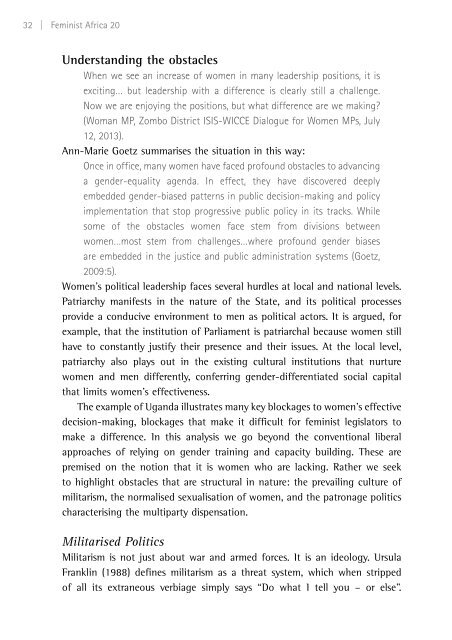Create successful ePaper yourself
Turn your PDF publications into a flip-book with our unique Google optimized e-Paper software.
32 | Feminist Africa 20<br />
Underst<strong>and</strong>ing the obstacles<br />
When we see an increase of women in many leadership positions, it is<br />
exciting… but leadership with a difference is clearly still a challenge.<br />
Now we are enjoying the positions, but what difference are we making?<br />
(Woman MP, Zombo District ISIS-WICCE Dialogue for Women MPs, July<br />
12, 2013).<br />
Ann-Marie Goetz summarises the situation in this way:<br />
Once in office, many women have faced profound obstacles to advancing<br />
a gender-equality agenda. In effect, they have discovered deeply<br />
embedded gender-biased patterns in public decision-making <strong>and</strong> policy<br />
implementation that stop progressive public policy in its tracks. While<br />
some of the obstacles women face stem from divisions between<br />
women…most stem from challenges…where profound gender biases<br />
are embedded in the justice <strong>and</strong> public administration systems (Goetz,<br />
2009:5).<br />
Women’s political leadership faces several hurdles at local <strong>and</strong> national levels.<br />
Patriarchy manifests in the nature of the State, <strong>and</strong> its political processes<br />
provide a conducive environment to men as political actors. It is argued, for<br />
example, that the institution of Parliament is patriarchal because women still<br />
have to constantly justify their presence <strong>and</strong> their issues. At the local level,<br />
patriarchy also plays out in the existing cultural institutions that nurture<br />
women <strong>and</strong> men differently, conferring gender-differentiated social capital<br />
that limits women’s effectiveness.<br />
The example of Ug<strong>and</strong>a illustrates many key blockages to women’s effective<br />
decision-making, blockages that make it difficult for feminist legislators to<br />
make a difference. In this analysis we go beyond the conventional liberal<br />
approaches of relying on gender training <strong>and</strong> capacity building. These are<br />
premised on the notion that it is women who are lacking. Rather we seek<br />
to highlight obstacles that are structural in nature: the prevailing culture of<br />
militarism, the normalised sexualisation of women, <strong>and</strong> the patronage politics<br />
characterising the multiparty dispensation.<br />
Militarised Politics<br />
Militarism is not just about war <strong>and</strong> armed forces. It is an ideology. Ursula<br />
Franklin (1988) defines militarism as a threat system, which when stripped<br />
of all its extraneous verbiage simply says “Do what I tell you – or else”.


